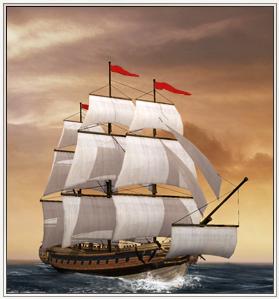Difference between revisions of "Sixth Rate (ETW Unit)"
(→Overview) |
|||
| Line 6: | Line 6: | ||
Historically, the sixth rates’ small size made them handy for scouting work and perfect where speed and good sailing qualities were required. They were a very good counter to privateers in smaller luggers, brigs and sloops; sixth rates can chase them down and have enough guns and men to win the subsequent engagement! They were also extremely useful in blockades, as they could sail in shallow waters and keep close watch on enemy ports. | Historically, the sixth rates’ small size made them handy for scouting work and perfect where speed and good sailing qualities were required. They were a very good counter to privateers in smaller luggers, brigs and sloops; sixth rates can chase them down and have enough guns and men to win the subsequent engagement! They were also extremely useful in blockades, as they could sail in shallow waters and keep close watch on enemy ports. | ||
| − | == | + | ==Overview== |
| − | Sixth rates are a useful ship for any early fleet. Though they lack the firepower of a fifth rate, they are significantly faster and handier, while still being more durable and having more guns than a brig or a sloop. Thus they are extremely useful for catching fast, annoying ships like brigs, sloops, galleys, etc. and allows the larger ships to concentrate on the enemy's stronger ships without having to be bothered by the little ones. They | + | |
| + | Sixth rates are a useful ship for any early fleet. Though they lack the firepower of a fifth rate, they are significantly faster and handier, while still being more durable and having more guns than a brig or a sloop. In fact, sixth rates are often the best ships for those factions that start with a navy. Thus they are extremely useful for catching fast, annoying ships like brigs, sloops, galleys, etc. and allows the larger ships to concentrate on the enemy's stronger ships without having to be bothered by the little ones. They are also good for destroying rocket ships or bomb ketches, as their smaller size and fast speed make it hard to hit with inaccurate rockets or mortar rounds. Larger ships, however, run the risk of being hit and set afire. Also, they can move quickly around ships like galleons, firing chain shot at them to rip their sails or knock down their masts, as they have 500 range as compared to the 400 range of galleons. | ||
| + | |||
| + | |||
Revision as of 20:25, 3 September 2011
Game Description
The Royal Navy system of rating ships defines a “sixth rate” as a small frigate: a single-deck ship, square-rigged, with around 28 nine-pounder guns, and a crew of around 200 men. This is the smallest vessel in the system set out by Samuel Pepys, and the smallest command of a post captain. This means that sixth rate captains are either old men, passed over for command, or young, ambitious officers looking to make their mark. It’s also worth pointing out that, even with “only” 28 nine-pounder cannons at his command, the captain of a sloop has more firepower than many generals ashore!
Historically, the sixth rates’ small size made them handy for scouting work and perfect where speed and good sailing qualities were required. They were a very good counter to privateers in smaller luggers, brigs and sloops; sixth rates can chase them down and have enough guns and men to win the subsequent engagement! They were also extremely useful in blockades, as they could sail in shallow waters and keep close watch on enemy ports.
Overview
Sixth rates are a useful ship for any early fleet. Though they lack the firepower of a fifth rate, they are significantly faster and handier, while still being more durable and having more guns than a brig or a sloop. In fact, sixth rates are often the best ships for those factions that start with a navy. Thus they are extremely useful for catching fast, annoying ships like brigs, sloops, galleys, etc. and allows the larger ships to concentrate on the enemy's stronger ships without having to be bothered by the little ones. They are also good for destroying rocket ships or bomb ketches, as their smaller size and fast speed make it hard to hit with inaccurate rockets or mortar rounds. Larger ships, however, run the risk of being hit and set afire. Also, they can move quickly around ships like galleons, firing chain shot at them to rip their sails or knock down their masts, as they have 500 range as compared to the 400 range of galleons.
